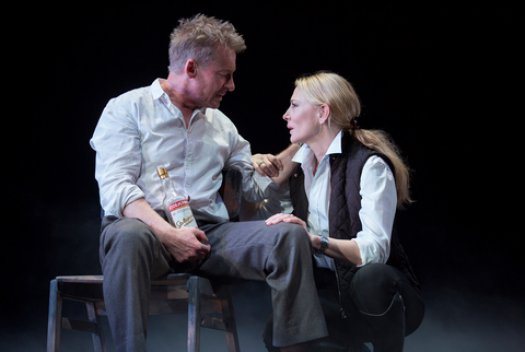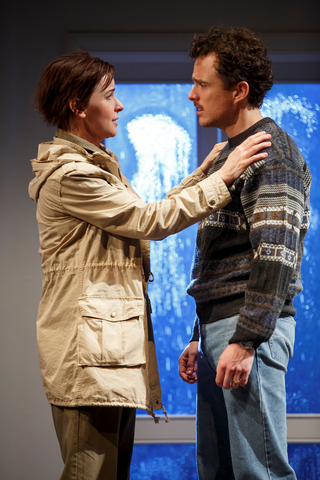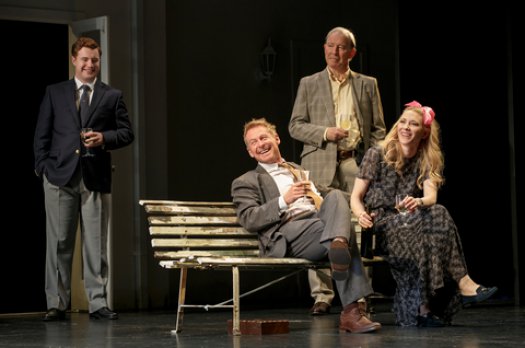The Present
Chekhov’s first play, “Platonov,” turns up in an updated version providing Cate Blanchett with her Broadway debut in this Sydney Theatre Company production.

Richard Roxburgh and Cate Blanchett in a scene from The Sydney Theatre Company’s production of “The Present” (Photo credit: Joan Marcus)
[avatar user=”Victor Gluck” size=”96″ align=”left” ] Victor Gluck, Editor-in-Chief[/avatar]Anton Chekhov’s first play was not Ivanov as most theatergoers believe, but a manuscript he wrote around 1880 between ages 18 and 20 while still a student. Abandoned when it was rejected by Maria Yermolova, the star of the Maly Theatre, whom he wrote it for, the play was found among his posthumous papers and first published in his collected works in 1923. As the title page was missing from the working draft which was all that exists, it has been translated and adapted under many names: The Play without a Title, Fatherlessness, Don Juan in the Russian Manner, Platonov, A Country Scandal, That Worthless Fellow Platonov, and Wild Honey, Michael Frayn’s version which appeared on Broadway in 1986 with Ian McKellen.
Chekhov would use many of the characters and situations in his later, more famous plays particularly Uncle Vanya. This unfinished, unwieldy (his brother Michael’s word) script with its 20 named characters which would take about five hours to stage is definitely in need of an edit. As the last play of his tenure as artistic director of the Sydney Theatre Company, Andrew Upton adapted it under the title The Present as a vehicle for his wife Cate Blanchett and her Uncle Vanya (New York City Center 2012) co-star, Richard Roxburgh. This production has reached New York with its entire cast intact representing both Blanchett’s Broadway debut and the first time the company has appeared on the Great White Way.
Upton’s version solves some problems and creates others. Updated to the 1990’s, the play is no longer about life in Tsarist Russia but the post-Perestroika world of Glasnost. While the original has characters talk about how much better life will be in the future, the new version has the characters wax nostalgic about the recent past but also talk about the challenge of the new Russia in the present. It is not obvious for much of the first scene that the play takes place in the Russian countryside.
One anachronism: did people wear cell phones on their belts – or even have cell phones – in the early 90’s? Under Irish director John Crowley, the mood and tone often seem very British, and the Australian accents come and go intrusively. A tragicomedy, it should probably be funnier than it is. At three hours, the play is still rather unwieldy though the final scene of each act packs quite a wallop. And then, of course, it gives Blanchett and Roxburgh some of the best roles of their careers.

Jacqueline McKenzie and Chris Ryan in a scene from The Sydney Theatre Company’s production of “The Present” (Photo credit: Joan Marcus)
The setting is Anna Petrovna’s party at her country house to celebrate her 40th birthday, presents expected. She hasn’t visited it in the ten years since the death of her elderly husband the General. She is surrounded by her 38-year-old step-son Sergei (from her husband’s first marriage), his new scientist wife Sophia, Nikolai (the local doctor), his new girlfriend Maria, and their father Ivan. Expected are Mikhail, a schoolteacher, who tutored both Sergei and Nikolai years ago, and his wife Sasha, Nikolai’s sister. Other locals invited are the landowners Alexei, a retired lawyer, his son Kirill, a Parisian DJ, Yegor, a businessman, and his student son Dimitri. Both Alexei and Yegor are suitors of Anna’s as she is broke and needs to marry money.
As soon as Mikhail and Sasha, his wife of five years, arrive he is the center of attention. With his sparkling promise as a young man, everyone has expected great things from him, but nearly an alcoholic, he has buried himself in the county as a rural teacher. However, a serial seducer or at least a world class flirt, he finds to his surprise that all the women throw themselves at him as the most charismatic man among them: Anna and Sophia both of whom he has known long in the past, the twenty-year-old Maria, and, of course, his wife Sasha who is still completely smitten with him, despite rumors of his philandering.
Upton has changed the fireworks to celebrate Anna’s birthday in Chekhov’s play to an actual attempt to blow up the folly where the birthday luncheon is to be held. Of course, as Hitchcock would say, if you show us a detonator you had better use it eventually. All are bored and the liquor flows freely. The love affairs get more and more complicated as Sergei’s wife and Nikolai’s girlfriend both pursue Mikhail, while Anna reminds him that she has been waiting for him even since they first met. However, he has a child and is domestically settled. Like Don Juan, the fun is all in the conquest not the consummation. What begins as a comedy eventually turns tragic as people get carried away in this new world of the present.
While the acting is superb under the auspices of director Crowley, creating a true ensemble, the play does not catch fire until one hour into it depicting the end of the raucous luncheon party at the beginning of the second act. In updating the play, Upton has unsuccessfully turned the Jewish merchant Vergerovich and his son Isaac into the sinister modern oligarchs Yegor and Dimitri which is not convincingly portrayed. Chekhov’s Osip formerly a horse thief is turned into ex-KGB now working in security, also not fully fleshed out, though he is still as menacing and malignant. However, in the second half of this long evening which moves more quickly, the pace picks up and the play becomes much more involving. Suddenly we care about the fate of these seemingly self-absorbed characters.
While Blanchett’s Anna is not the central character but just one of Mikhail’s stable of women, when she is on stage the action all revolves around her. She runs the gamut of emotions from boredom to ecstasy, from manipulator to a woman in love to a maternal figure. It is a bravura role and she gives the sort of bravura stage performance that we have come to expect from her. (This is her fifth time appearing on New York stages). Roxburgh has the difficult role of Mikhail Platonov. Is he a hero or a villain? Is he a seducer or a victim? He treads a path between sympathetic and unsympathetic, pursuer and prey, man and boy. He makes Mikhail a moody extrovert as well as a deep thinking philosopher. His Mikhail is a complex man and there is great chemistry between Roxburgh and Blanchett.

Brandon McClelland, Richard Roxburgh, David Downer and Cate Blanchett in a scene from The Sydney Theatre Company’s production of “The Present” (Photo credit: Joan Marcus)
Upton’s Sophia, a doctor just back from working in Africa, is much deeper than Chekhov’s petty bourgeois, and Jacqueline McKenzie (The Deep Blue Sea, Ya-Ya Sisterhood) turns her into a serious person. Chris Ryan as her new husband Sergei is a fine portrait of the idle rich. Toby Schmitz as Dr. Nikolai is quite the comic character, while Susan Prior as his sister Sasha is pathetically simple. We know her hold on Mikhail will be tenuous.
Anna Bamford’s Maria is a young woman passionately in love for the first time, while Andrew Buchanan’s Osip captures his menacing qualities without much exertion. Martin Jacobs (Alexei) and Marshall Napier (Ivan) are believable as two old men nostalgic for the past. As Alexei’s materialistic son Kirill just back from Paris, Eamon Farren is a hilarious parody of the contemporary sophisticate. Unfortunately, David Downer and Brandon McClelland are unable to do much with Upton’s invented roles as the oligarchs as he hasn’t given them much to do or say.
The sets by Alice Babidge tend toward the minimalist and as such are devoid of atmosphere. However, her costumes cleverly define the characters. Nick Schlieper’s lighting is best in the smoke-filled scene that begins the third act. Stefan Gregory is responsible for the music which begins each scene as well as the sound design so important for the literal fireworks.
Andrew Upton’s The Present is a mixed blessing. On the one hand, it brings the team of Cate Blanchett and Richard Roxburgh to New York for their Broadway debuts, and reintroduces theatergoers to a fairly unknown play by Anton Chekhov. On the other hand, the updating which is intended to make the play more accessible creates its own problems and much of the long evening is heavy going. However, Blanchett and Roxburgh make their own fireworks and each act ends with high drama, which is what we want from live theater. It is another excellent production from the esteemed Sydney Theatre Company which also already brought us Hedda Gabler, A Streetcar Named Desire, Uncle Vanya and The Maids.
The Present (through March 19, 2017)
The Sydney Theatre Company Production
Ethel Barrymore Theatre, 243 W. 47th Street, in Manhattan
For tickets, call 212–239-6200 or visit http://www.ThePresentBroadway.com
Running time: three hours with one intermission






Leave a comment